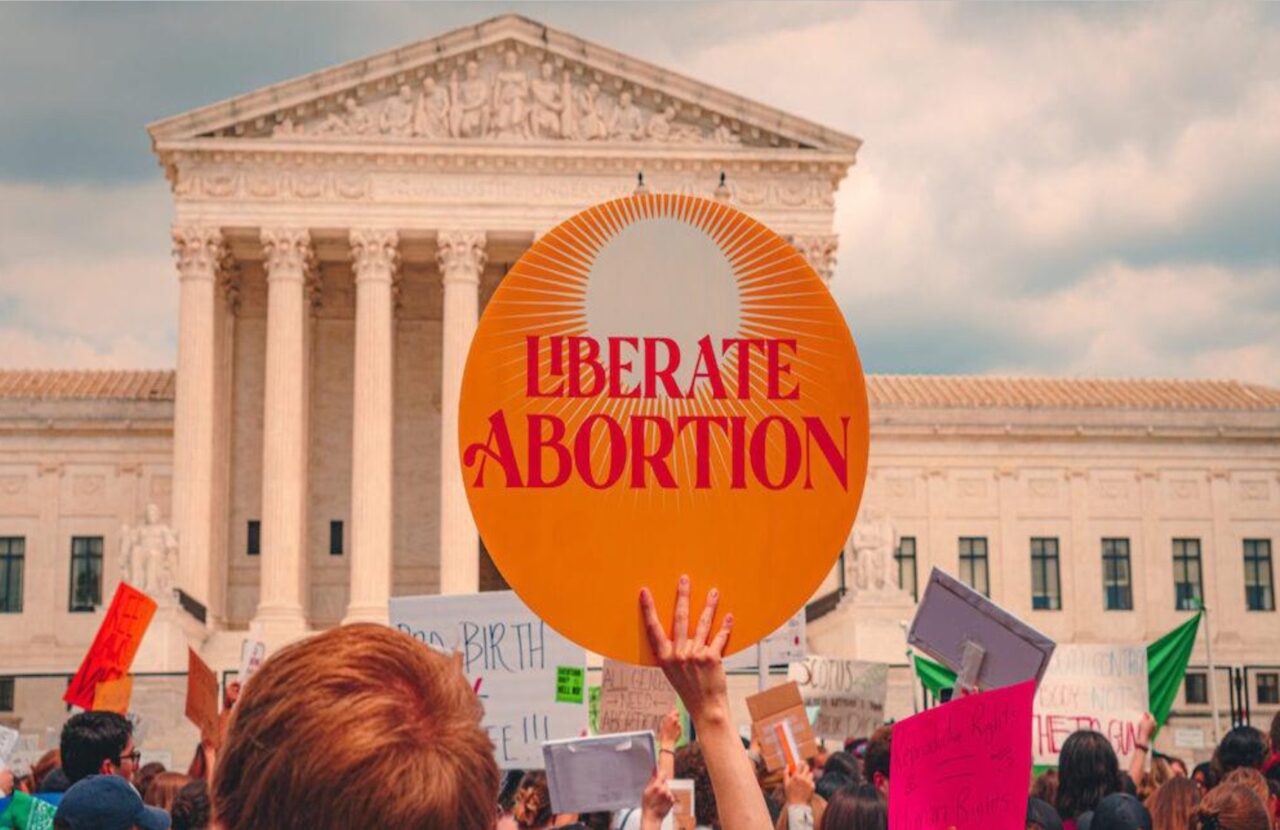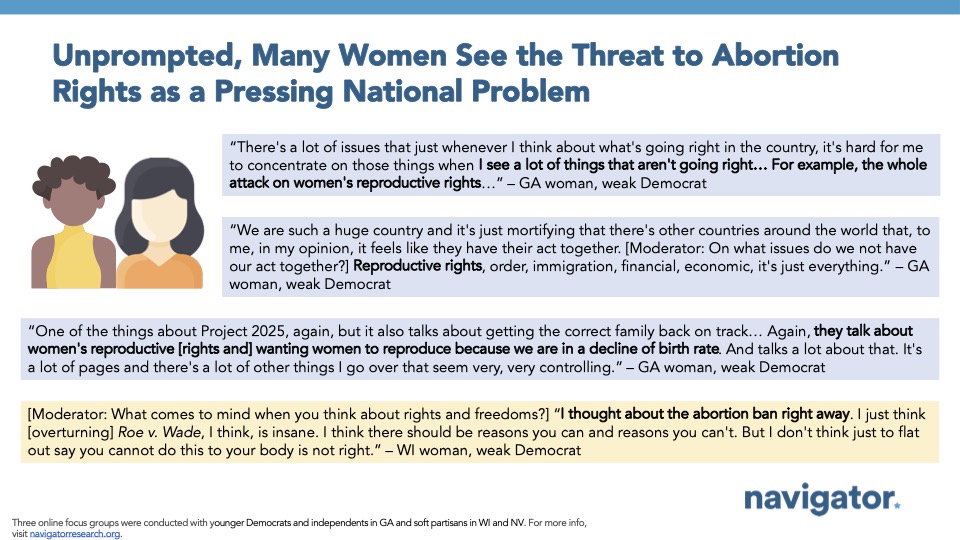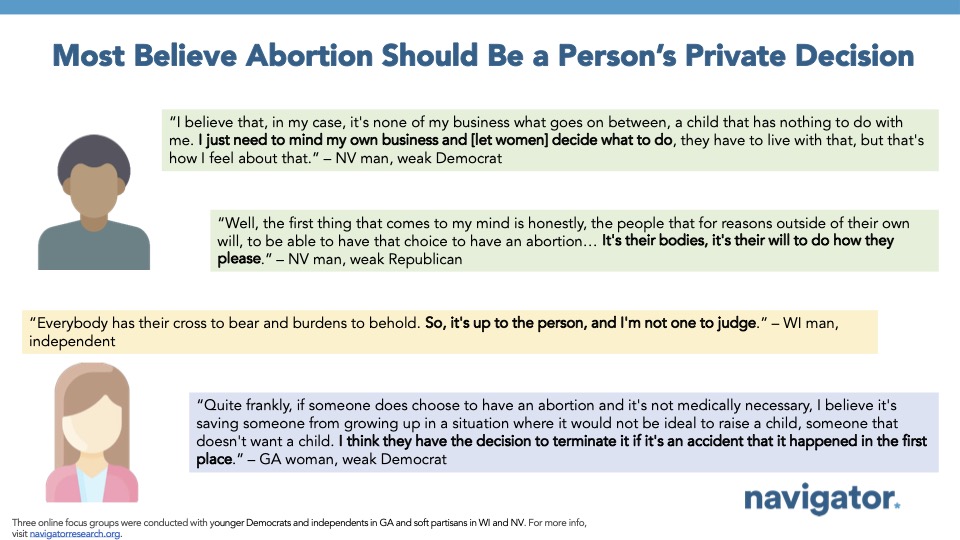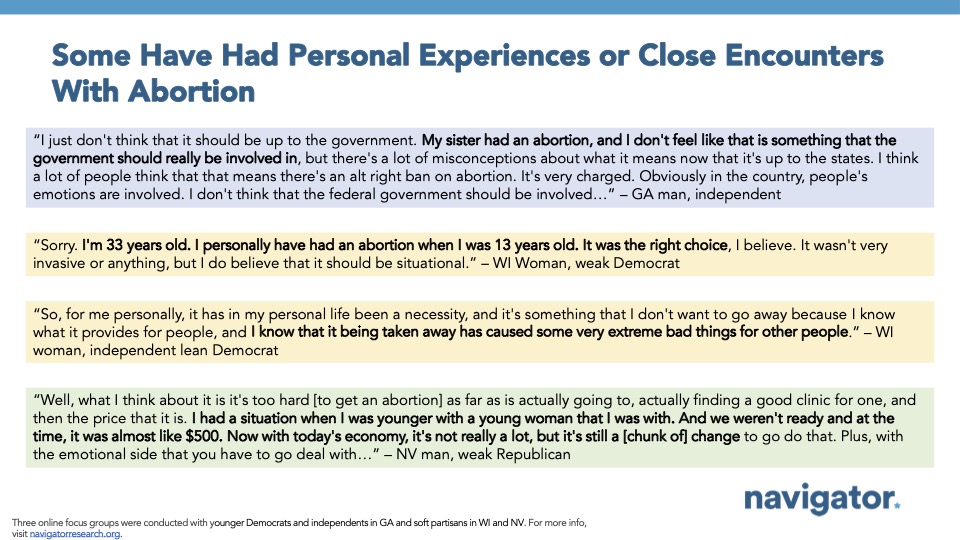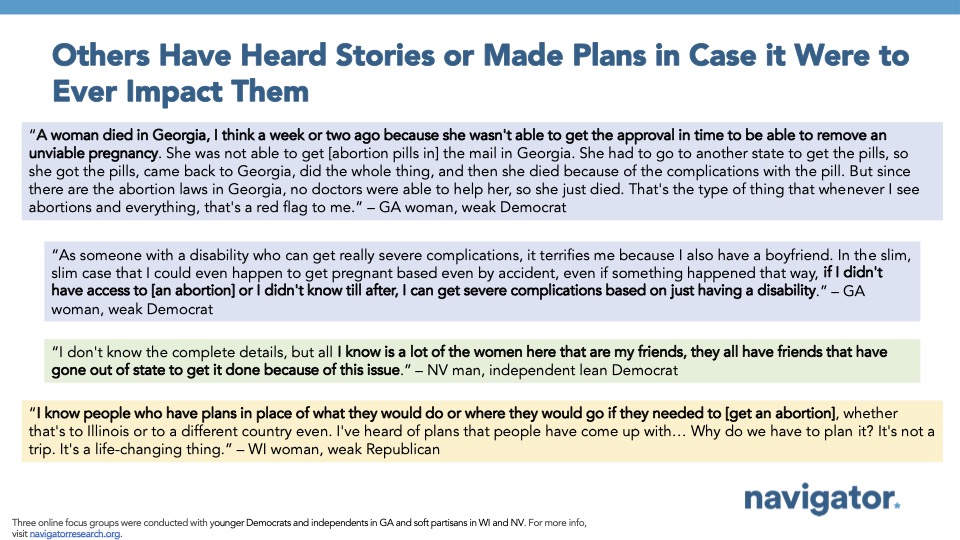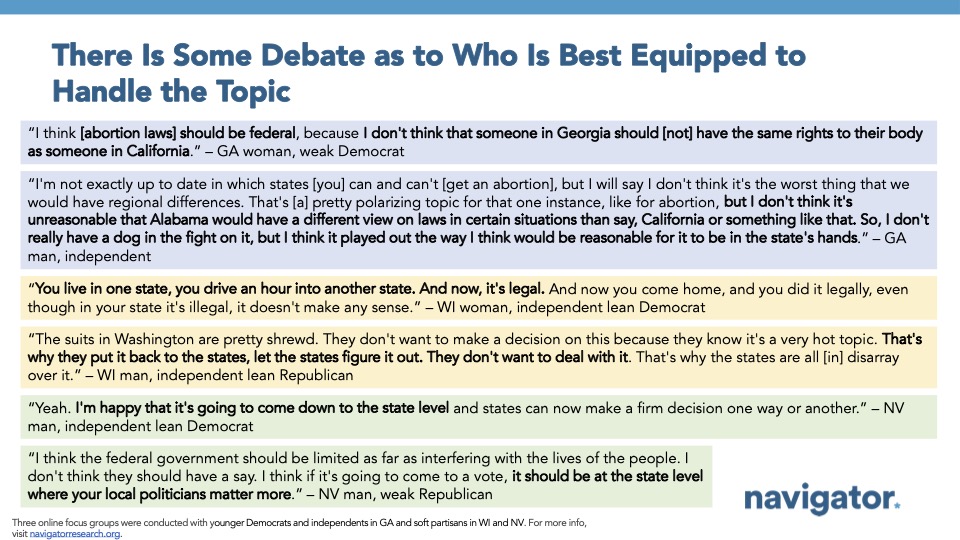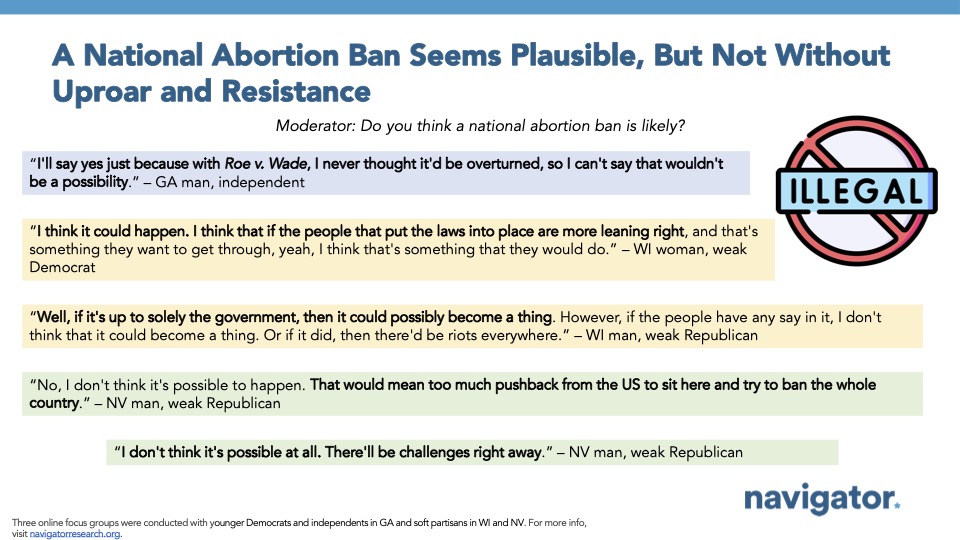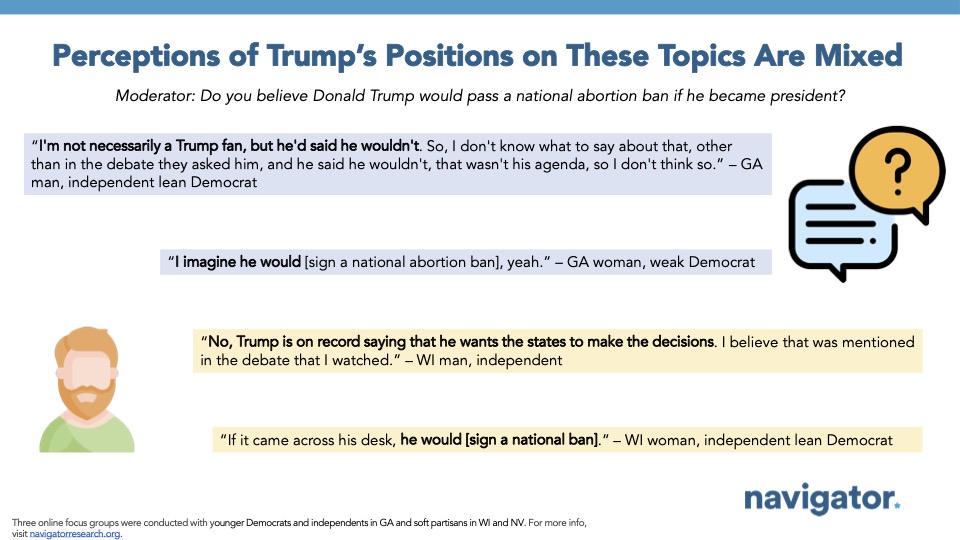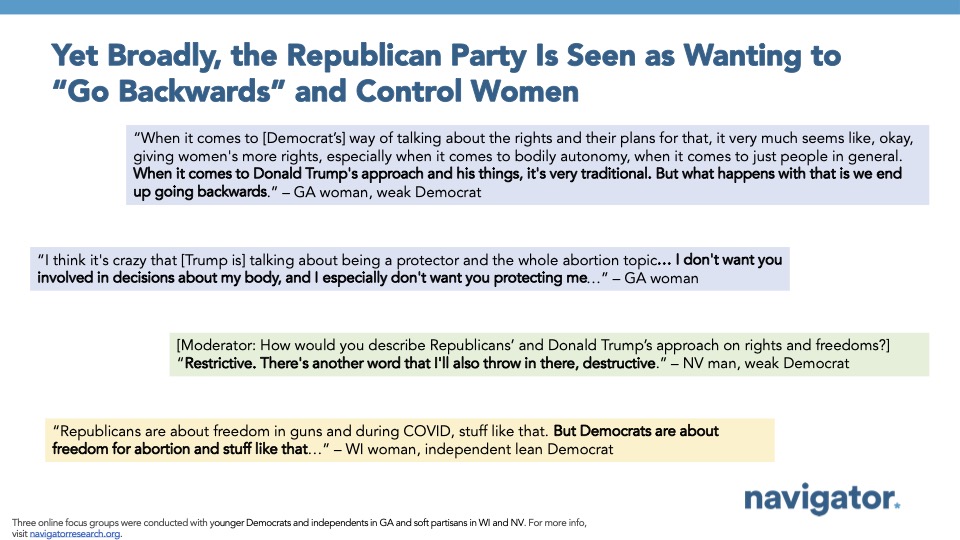Focus Groups: Abortion Rights in the U.S.
This Navigator Research report contains findings from focus groups among young Democrats in Georgia, independent men of color in Nevada, and white independents in Wisconsin on the latest perceptions of abortion rights in the country, including how they view the impact of Roe being overturned, and whether other reproductive health care is viewed as at risk.
Threats to abortion rights loom large as a pressing national problem.
When asked about the major issues facing the country today, participants largely lament economic anxiety like the rising cost of living and housing costs. As a Wisconsin man stated: “Everything seems to be going up except our wages.” Others mention abortion rights, like a Georgia woman who said: “There’s a lot of issues that just whenever I think about what’s going right in the country, it’s hard for me to concentrate on those things when I see a lot of things that aren’t going right… for example, the whole attack on women’s reproductive rights…”
Participants largely viewed abortion as a personal choice not meant for others to be involved in. As a Wisconsin man said: “Everybody has their cross to bear and burdens to behold. So it’s up to the person, and I’m not one to judge.” A Nevada man similarly stated: “I believe that in my case, it’s none of my business what goes on between, a child has nothing to do with me. I just need to mind my own business and what [women] decide to do, they have to live with that, but that’s how I feel about that.”
The impact of overturning Roe is viewed negatively, even for those not experiencing the immediate consequences personally.
Some participants view abortion in more personal terms. One Georgia woman said: “[As] someone with a disability who can get really severe complications due to medical reasons, it [Roe v. Wade being overturned] terrified me…I could die if I got pregnant, there is a very big chance that I could die.” A Wisconsin woman noted that: “I know people who have plans in place of what they would do or where they would go if they needed to, whether that’s to Illinois or to a different country even. I’ve heard of plans that people have come up with.” A Nevada man similarly stated: “I don’t know the complete details, but all I know is a lot of the women here that are my friends, they all have friends that have gone out of state to get it done because of this issue.”
Men and women at times have divergent understandings about the importance of the issue. A Georgia woman stated: “People don’t understand it until they’re in it. And so unless you have a close one or know someone who has had abortions, who has been through that, people don’t think about it. So they have their own opinions based on what they see, and unless they see it right in front of them or see it affect someone close to them, they don’t get it.” A Wisconsin man remarked: “I think there’s about 20 different versions or varieties of birth control outside of abstinence. So I guess as a guy, I don’t understand, other than the rape, incest thing, why is people getting pregnant when there’s all this birth control? I just don’t get it.” A Nevada man also said: “Really, [abortion is] not important to me, but I think it should be allowed because it’s a woman’s right.”
There is some debate whether laws regarding abortion should be determined at all by the state or federal government, but a national ban is overwhelmingly unpopular.
When asked who should determine laws regarding abortion, many were dumbfounded that states would have different policies. A Wisconsin woman stated: “You live in one state, you drive an hour into another state. And now, it’s legal. And now you come home and you did it legally, even though in your state it’s illegal, it doesn’t make any sense.” A Georgia woman similarly noted: “I think [abortion laws] should be federal, because I don’t think that someone in Georgia should [not] have the same rights to their body as someone in California.” Others did not feel the federal government should be involved, with one Nevada man saying: “I think the federal government should be limited as far as interfering with the lives of the people. And I think they shouldn’t, I don’t think they should have a say. I think if it’s going to come to a vote, it should be at the state level where your local politicians matter more.” Reminder: Nearly three in five Americans agree more that abortion should be legal nationwide by a 14-point margin, rather than individual states decide.
Participants believed a national abortion ban could be enacted, but that it would not be met without resistance. A Wisconsin woman said: “Well, if it’s up to solely the government, then it could possibly become a thing. However, if the people have any say in it, I don’t think that it could become a thing. Or if it did, then there’d be riots everywhere.” A Nevada man similarly thought there would be pushback: “No, I don’t think it’s possible to happen. That would mean too much pushback… to sit here and try to ban the whole country.” A Georgia man viewed it as possible because of the overturning of Roe: “I’ll say yes [a national abortion ban is likely] just because with Roe v. Wade, I never thought it’d be overturned, so I can’t say that wouldn’t be a possibility.”
Bans on in vitro fertilization and birth control, and potential government monitored pregnancies are viewed as less likely, though extremely detested.
On the possibility of the government monitoring people’s pregnancies, a Wisconsin man said: “Not going to happen. No. Not going to happen. How could it?” A Georgia man similarly said: “Yeah, I don’t know. I don’t see it likely that they’re banning travel and I don’t know how you would monitor that.” Bans on IVF and making it harder to access birth control were more believable but still faced disbelief. As a Georgia man said: “I think Congress would try to, but I don’t think it would pass. I think there’s too much… A lot has happened.” A Wisconsin woman stated: “Nothing is sacred. Nothing is safe. Nothing is impossible. I think all of it is believable because all of it is in conversation and different states are at different levels of trying to make all or some of it happen. So it is believable because there’s already actions being taken to attempt to do some of those things.”
Laws related to IVF, abortion, and birth control feel connected to participants. A Wisconsin woman stated: “It’s all one thing. It’s all about women… someone wants to control somebody.” A Wisconsin man also saw the restriction of reproductive care as simply wanting “control.” A Georgia man also noted: “I think it’s one set of issues, but it is one big set and then just little buckets inside that set.”
